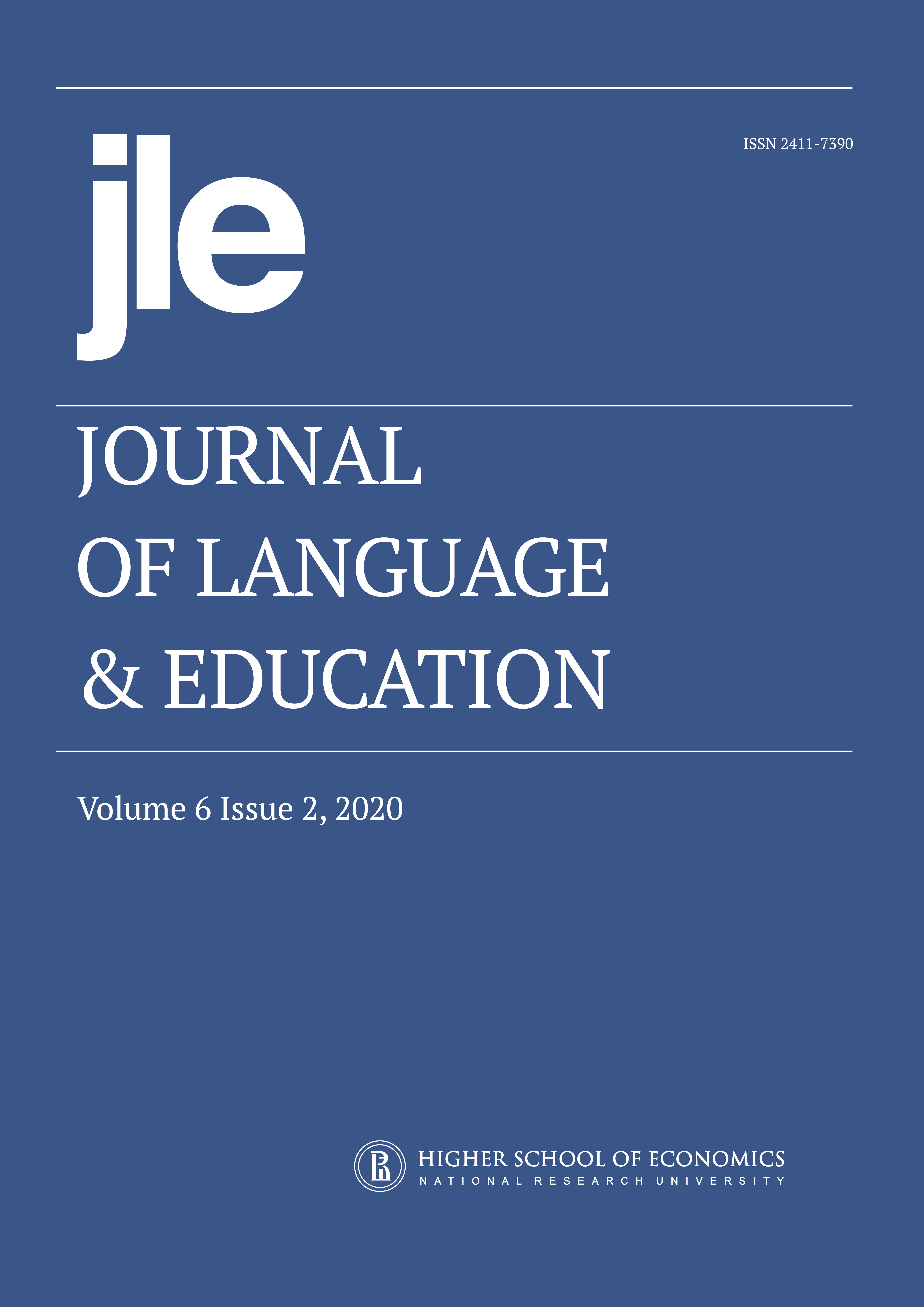A Comparison of EFL Fifth Graders’ Vocabulary Acquisition through Skype Videoconferencing and Face-to-face Picture Book Storytelling
Abstract
This quasi-experimental study explores the relative efficacy of computer-mediated communication (CMC) and face-to-face picture book storytelling for promoting young EFL learners’ English word acquisition. Thirty-two young EFL learners participated in a 40-minute story session in the two aforementioned modes. Receptive and productive word gains were assessed through immediate and delayed receptive vocabulary tests and productive story recall tests. To better explain how the CMC and face-to-face settings affected the participants’ word gains, their involvement in the two types of storytelling settings was evaluated using an involvement load survey. The results show that the participants’ task involvement was higher in the face-to-face setting than the CMC setting, which led to better word gains. Within each setting, high-involvement participants’ word gain was better than that of their low-involvement counterparts. However, the difference between high-involvement and low-involvement participants was only manifest in the receptive word gains for the participants in the CMC setting, but not the productive word gains. These findings suggest that face-to-face storytelling might be the more effective setting when picture book storytelling is adopted to promote EFL young learners’ word gains, especially for receptive word gains.
Downloads
References
Acar, A. (2007). Teaching languages from a distance through multipoint videoconferencing. Foreign Language Annals, 40(2), 311-319.
Akiyama, Y. (2019). Using Skype to focus on form in Japanese telecollaboration: Lexical categories as a new task variable. In Computer-Assisted language learning: Concepts, methodologies, tools, and applications (pp. 617-647). IGI Global.
Anderson, T., & Rourke, L. (2005). Videoconferencing in kindergarten-to-grade 12 settings: A review of the literature. Alberta Education.
Bower, J., & Kawaguchi, S. (2011). Negotiation of meaning and corrective feedback in Japanese / English eTandem. Language Learning & Technology, 15, 41-71.
Chen, J. J., & Yang, S. C. (2014). Fostering foreign language learning through technology-enhanced intercultural projects. Language Learning & Technology, 18(1), 57-75.
Chung, S. F. (2012). Based vocabulary instruction for English language learners. The Reading Matrix, 12(2), 105-120.
Cuestas, A. (2013). Using Skype in a primary class: A case study. Bellaterra Journal of Teaching & Learning Language & Literature, 6(2), 49-68.
Fahy, P. J. (2007). The occurrence and character of stories and storytelling in a computer conference. Distance Education, 28(1), 45-63.
Han, Z.H., & Chen, C-L. (2010). Repeated-reading-based instructional strategy and vocabulary acquisition: A case study of a heritage speaker of Chinese. Reading in a Foreign Language, 22(2), 242-262.
Hu, H. M., & Nassaji, H. (2016). Effective vocabulary learning tasks: Involvement load hypothesis versus technique feature analysis. System, 56, 28-39.
Hulstijn, J. H., & Laufer, B. (2001). Some empirical evidence for the involvement load hypothesis in vocabulary acquisition. Language Learning, 51(3), 539-558.
Kim, H. Y. (2014). Learning opportunities in synchronous computer-mediated communication and face-to-face interaction. Computer Assisted Language Learning, 27(1), 26-43.
Kirsch, C. (2016). Using storytelling to teach vocabulary in language lessons: Does it work? The Language Learning Journal, 44(1), 33-51. DOI: https://doi.org/10.1080/09571736.2012.733404
Kitade, K. (2000). L2 learners' discourse and SLA theories in CMC: Collaborative interaction in internet chat. Computer Assisted Language Learning, 13(2), 143-166.
Laufer, B., & Hulstijn, J. (2001). Incidental vocabulary acquisition in a second language: The construct of task-induced involvement. Applied Linguistics, 22(1), 1-26.
Lee, L. (2002). Synchronous online exchange: A study of modification devices on non-native discourse. System, 30(3), 275-288.
Lee, S. Y. (2005). The robustness of extensive reading: Evidence from two studies. The International Journal of Foreign Language Teaching, 1(3), 13-19.
Lim, B. J., & Pyun, D. O. (2019). Korean foreign language learning: Videoconferencing with native speakers. In Computer-Assisted language learning: Concepts, methodologies, tools, and applications (pp. 1123-1146). IGI Global.
Lowenthal, P.R., & Dunlap, J.C. (2010). From pixel on a screen to real person in your students' lives: Establishing presence using digital storytelling. Internet and Higher Education, 13, 70-72.
Lugo-Neris, M. J., Jackson, C. W., & Goldstein, H. (2010). Facilitating vocabulary acquisition of young English language learners. Language, Speech, and Hearing Services in Schools, 41(3), 314-327.
Malin, G. (2010). Is it still considered reading? Using digital video storytelling to engage adolescent readers. The clearing house, 83(4), 121-125.
Morgan, H. (2013). Technology in the classroom: Using Skype for exciting projects. Childhood Education, 89(3), 197-199.
Nation, P., & Coady, J. (1988). Vocabulary and reading. In R. Carter & M. McCarthy (Eds.), Vocabulary and language teaching (pp. 97-110). Longman.
Ockert, D. (2015). Increases in Japanese EFL Learners' Motivation, International Posture, and Interest in Foreign Language Activities after Skype Exchanges. Digital Culture & Education, 7(2), 206-226.
Rassaei, E. (2017). Video chat vs. face-to-face recasts, learners' interpretations and L2 development: A case of Persian EFL learners. Computer Assisted Language Learning, 30(1-2), 133-148.
Terhune, N. M. (2016). Language learning going global: Linking teachers and learners via commercial Skype-based CMC. Computer Assisted Language Learning, 29(6), 1071-1089.
Tsukamoto, M., Nuspliger, B., & Senzaki, Y. (2009). Using Skype copyright to connect a classroom to the world: Providing students an authentic language experience within the classroom. In CamTESOL conference on English language teaching: Selected papers (vol. 5, pp. 162-168). TESOL.
Willems, M. (2006). Edwina: The dinosaur who didn't know she was extinct. Hyperion Books for Children.
Yen, Y. C., Hou, H. T., & Chang, K. E. (2015). Applying role-playing strategy to enhance learners' writing and speaking skills in EFL courses using Facebook and Skype as learning tools: A case study in Taiwan. Computer Assisted Language Learning, 28(5), 383-406. DOI: https://doi.org/10.1080/09588221.2013.839568
Yeung, S. S., Ng, M., King, R. B., Yeung, S. S., NG, M. L., & Ronnel, B. (2016). English vocabulary instruction through storybook reading for Chinese EFL kindergarteners: Comparing rich, embedded, and incidental approaches. The Asian EFL Journal Quarterly, 18(2), 89-112.
Zou, D. (2017). Vocabulary acquisition through cloze exercises, sentence-writing and composition-writing: Extending the evaluation component of the involvement load hypothesis. Language Teaching Research, 21(1), 54-75.
Copyright (c) 2020 National Research University Higher School of Economics

This work is licensed under a Creative Commons Attribution 4.0 International License.
Authors who publish with this journal agree to the Copyright Notice.



